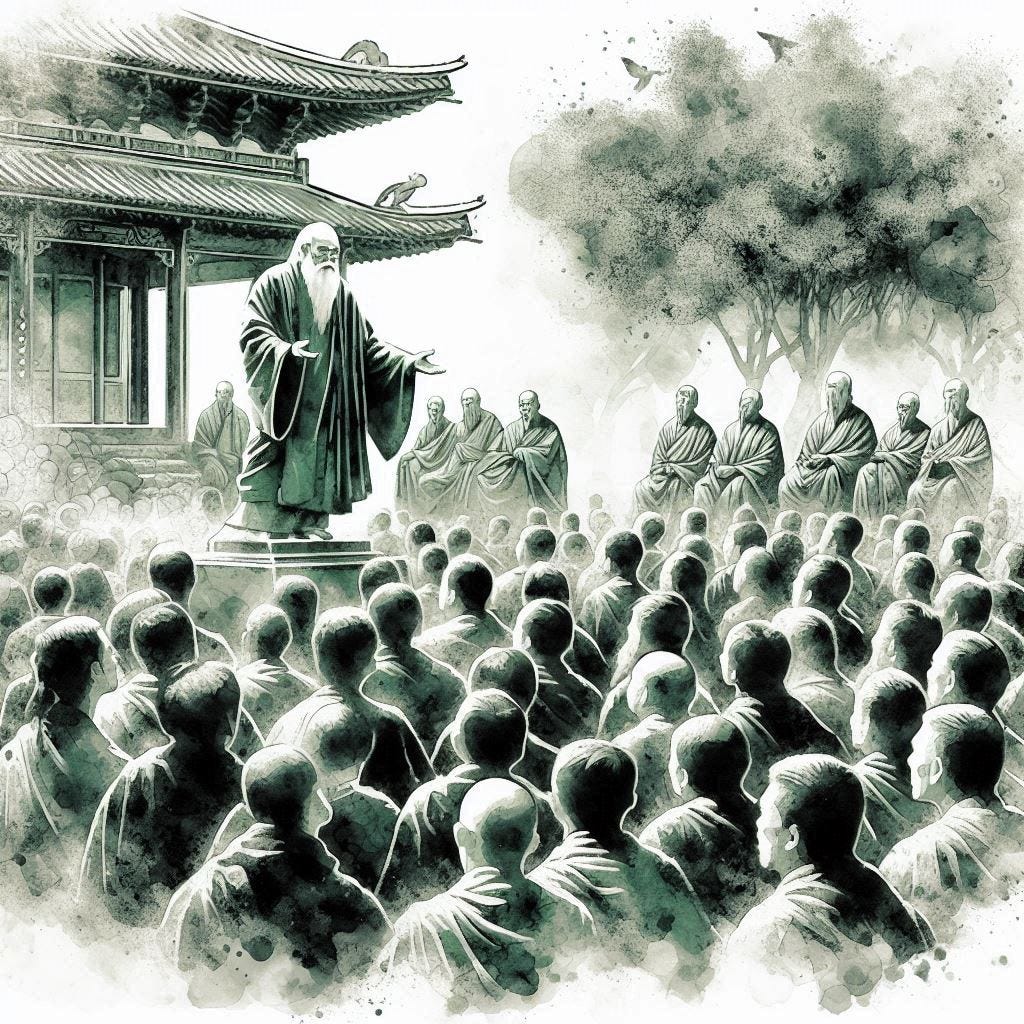To the deep thinkers,
Welcome to the Deep Thinkers Newsletter: A collection of essays dedicated to going beyond the surface.
If you’re new here, check out the Deep Thinkers archive.
I’ve had this essay sitting in my drafts for a while now, unsure of how to finish it—ironically feeling like I don’t have the authority to speak on a topic like this. I value discipline and self-control, yet I’ve struggled to stay on the right path lately.
I guess that makes me human—fallible, flawed, and, at times, hypocritical.
I’m trying to get back on track, though, so I figured now was the right time to finish and share this piece on living what you preach. Because I sure as hell needed the reminder.
I hope these words help you as much as they’ve helped me.
Confucius, the revered Chinese philosopher whose teachings continue to shape East Asian thought, didn’t merely preach his philosophy—he lived it. His mission was clear: to cultivate moral order in the world and inspire love through virtuous action.
But Confucius wasn’t concerned with earning the title of “sage.” He didn’t need labels. Instead, he demonstrated his wisdom by embodying the principles he taught. He emphasized the power of ethical relationships, set a gold standard for education, and championed justice and integrity, not through words alone, but through the way he lived his life.
Among his most lasting teachings is the Silver Rule, which states:
Do not treat others in ways you would not want to be treated.
It seems obvious—but alas, we fall short of this simple principle time and time again. Somewhere along the way, we began prioritizing words over action, valuing hollow rhetoric over tangible acts of good—ultimately forgetting that true integrity is proven through what we do, not what we say.
There was a time when embodying our philosophy was essential for earning a favorable reputation. It wasn’t enough to speak about our values—we had to live them through our actions, through the way we carried ourselves and treated others.
But we’ve drifted far from those days. Today, it’s the best facade or performance that wins. Eloquence and intensity of speech seem to be all it takes for someone to be perceived as virtuous.
We’ve fallen into the trap of believing that holding certain beliefs is enough. But many people don’t live in alignment with what they claim to stand for, relying instead on carefully curated personas to create the illusion of virtue.
The truth is, our philosophy should be evident in how we live. We shouldn’t have to announce that we are authentic and moral people—these qualities should shine through in how we live our lives.
In other words, our reputation should be built on our deeds, not on how persuasively, forcefully, or passionately we speak about our beliefs and values.
As Confucius said, “The true gentleman does not preach what he practices till he has practiced what he preaches.”
Proof of virtue
Words do matter. Of course they do. But they lose their potency when our actions don’t align with them. We might fool those around us, but we can’t fool ourselves. Our egos may try to keep us in a state of delusion, but the further our actions drift from our words, the more likely we are to face an identity crisis.
Inner peace comes from living in alignment with our values, and that requires honest actions to back up our claims.
When our actions reflect our beliefs, we gain not only inner strength but also genuine social leverage. Authenticity silences imposter syndrome and grounds us in confidence, and we begin to attract the kind of people that mesh with who we genuinely are, rather than those who like us for the persona we’ve created.
Yet, sadly, we live in a world where people no longer need to lead with honest actions to gain social respect.
Take politicians, for example. They make endless promises, selling themselves to the masses as moral public servants, and yet many only prioritize their personal agendas along with the agendas of their powerful allies.
Today, virtue can be ‘proven’ with charisma and a decent-sized following on the internet, but it was once shown through consistent, honorable actions. Now, the lines between appearance and authenticity have blurred, allowing us to project an image of goodness without putting in the hard work of living it.
“You are what you do, not what you say you’ll do.” — Carl Jung
The problem of valuing words over actions has been magnified by the continued influence of the internet—especially social media. Nowadays, we can spend our days parroting information online, making it increasingly difficult to distinguish those with noble intentions from the charlatans.
A bit of wisdom I was given years ago—and still hold close to this day—is that talking at people is not a productive form of communication or teaching. If we want to teach, if we want to be collectors and conveyors of wisdom, then verbal cardio alone falls well short of the line.
The very best teachers and philosophers embody their lessons, demonstrating their values through action and engaging others in meaningful learning experiences.
In an age where words can be broadcast instantly to a global audience, it’s all too easy for people to rely on empty rhetoric and what I’ll call keyboard activism. The internet has become a breeding ground for moral outrage and virtue-signaling, where the loudest voices often belong to those more interested in stroking their egos than generating real change—typing away until their thumbs are sore and their egos are satiated.
In the real world, people who know us can hold us accountable when our actions don’t align with our words. But online, where many relationships exist in a vacuum of curated personas, accountability is often absent.
It’s become all too common for people to jump online and shame others while living lives that are, at best, morally questionable.
This pattern reaches its peak when political or social issues dominate the conversation. What should be an opportunity for meaningful dialogue often devolves into a toxic spiral of I’m-more-moral-than-you arguments.
In the end, the real issues get lost in the noise—drowned out by performative virtue-signaling and empty words, leaving behind a pile of unresolved problems that demand action, not moral grandstanding.
The antidote
So, is there a way to fix this problem?
I believe there is. But as with most moments of clarity that elevate our consciousness, the journey begins with self-awareness and personal responsibility.
We must be brutally honest with ourselves on an individual level. Are we preaching more than we practice? Do our words—the ones we speak, the ones we write—align with the way we carry ourselves?
Nobody is perfect, but our goal should always be to align our actions with our values as often as we can. As the Stoic philosopher, Epictetus, wisely said: “Don’t talk about your philosophy; embody it.”
Even in writing this essay, I understand that this is not enough. It’s something, but it’s not everything. True transformation demands focused effort and action. Without putting philosophy into practice, even the most profound insights remain hollow.
With that in mind, here’s a short list that has helped me as I try to embody my own philosophy.
Practice first — Real respect comes when we have actions to back up our words. Again, words aren’t the problem. The problem is thinking that words are enough. When we’ve had the experiences, learned the life lessons, and endured the sacrifices and suffering—and then speak about our philosophy—our words carry a different weight to them. In short, we live it, we practice it—and then we speak about it.
Eliminate the excuses — When we stop making excuses, we become more aware of our areas of opportunity. Excuses prevent us from seeing how we contribute to the problems in our lives. But when we cut excuses out, self-awareness and honesty are given the space to blossom. Self-growth becomes automatic, and practicing what we preach becomes a non-negotiable.
Don’t break promises to yourself — We all know we shouldn’t break promises to others, but we often ignore this advice when it comes to ourselves. This is how so many of us stay stuck in unhappy situations. We’re great at telling others what they should do. We want others to be courageous, honest, disciplined, non-judgmental, and kind. But do we always act in line with these traits? If we promise to be more honest, more charitable, and more courageous, then we should do all we can to keep these promises.
Mindful actions — Too often, we go through life acting or reacting without much thought behind our choices. Sometimes, this leads to inconsequential outcomes or funny stories. But when we treat our relationships, careers, or self-development this way, the consequences can be catastrophic. We end up living a life shaped by impulses rather than intention, and it takes intentionality to live in accordance with our values.
In summary, if we want to make a real difference in the world, we must lead with our works rather than our words. Ditch the excuses. Stop breaking promises to yourself. And be mindful of everything you do.
And most important of all, have a blessed day.
If this essay resonated with you, consider supporting my writing journey! You can ‘buy me a coffee’ using the link below 👇🏾
What I’m into this week:
The Christian teachings I’ve been handed haven’t always been freeing. They haven’t always emanated truth or beauty, but that doesn’t mean I forsake the good I have witnessed. The good I wasn’t just given, but that I was born into.
I’ve had a lifelong struggle with my religious upbringing. Raised in an evangelical Christian home, I experienced the extremes of religious dogma—the bigotry disguised as love, the repression of genuine emotions, and the demonization of anything that didn’t directly sanctify Him.
When I was old enough to make my own choices, I chose to turn my back on everything Christianity had to offer. Yet, interestingly enough, the older I get, the more I find myself inching back toward the teachings of my youth. Not in any official capacity—I don’t go to church or follow most Christian traditions or social opinions —but as Alex writes, “(…) the answer that feels most true is that I’ll never not be a Christian; it’s my native tongue.”
I don’t know if I can call myself a Christian, but I do know this: the good in those teachings has stayed with me. I can’t erase them, and I’m done trying to.
Much love,
- Jon ♾️







Thank you Jon for sharing your story, vulnerability, and wisdom! The first guideline, to practice first, has been so helpful to me. I remember back when I was online dating, I was trying to represent my racial identity (white) alongside my commitment to being anti-racist. I struggled with the verbiage so much that I ended up taking it out. Fast forward nearly a decade, after having started to really engage with anti-racist work, and the words have flowed freely. I hadn’t realized this until reading your essay, that the reason I couldn’t write about it on Tinder was because I actually wasn’t doing it. Thank you for this loving and informative reflection.💜
Thanks for this piece, Jon. I absolutely agree. We must live our values and act with intention to bring about the world we want to see. I'm trying to exemplify that in my Substack, Words over Swords. I encourage you to check out my work, if you're so inclined. Looking forward to reading more from you.